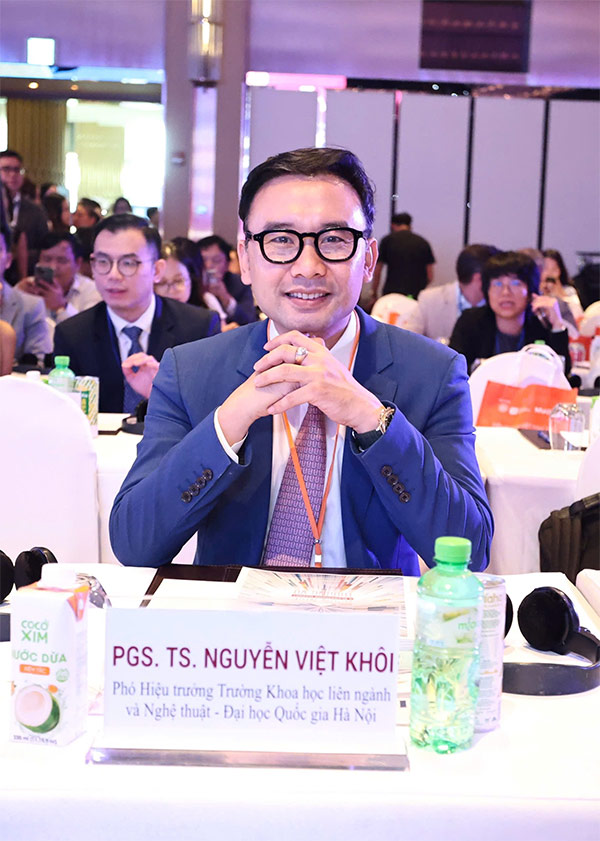In this year's admission season, many students have set many wishes, aiming for many different career positions. From the perspective of educational management, how do you assess the labor market will change in the context of the global coverage of Artificial Intelligence?
- The emergence and explosion of AI (Artificial Intelligence) is creating a major restructuring in the labor market. AI systems will increase analytical capabilities, but lack the ability to understand emotions and reverse thinking. We will see the appearance of new professions that are currently very vague. For example, the profession of AI Trainer (AI training), Prompt Engineer (command writing engineer for AI), Ethical AI Specialist (AI ethics expert), Data Storyteller (a data storyteller... It is like 10 years ago that no one thought there would be a profession of TikTok content strategist (building content strategies for Tiktok channels).
Digital skills become life skills in the new context. Even doctors, lawyers and teachers must know how to use AI to increase productivity. Those who do not know how to take advantage of artificial intelligence will fall behind, even when working in an industry that is not purely technology.
AI also makes remote working easier than ever, making job competition expand from local to global. We can do it for any company in any corner of the world, but it also means you will have to compete with personnel in many different countries on a global scale.

So, in your opinion, which majors will catch up with the AI trend?
- When choosing an industry, young people should not just follow the "hot trend" industry because technology will change very quickly, leading to industries that can change accordingly. Therefore, you should consider choosing majors that intersect AI and human strengths such as Data Science, Artificial Intelligence, Cyber Security, Software Engineering... These are majors that are suitable for you to adapt to toan, logical reasoning, and technology. This is also the industry group that will directly create AI, operate AI, teach AI to improve...
For those who love creativity, design, and digital media, they can consider majors such as user experience design, digital marketing, game design, or cross-platform content creation. These are industries that use AI to support creative product creation, but humans orient the ideas and development strategies of those products.
For the group of friends who like to manage, manage, economics, build and implement business strategies, they can choose Business Administration, Finance, Investment Analysis, Smart Supply Chain... These industries will use AI to quickly analyze data, but decisions and strategies are still taken up by humans.
For the group of friends who love traditional fields but the variation due to AI application must be mentioned such as Precision Medicine (Precision Medicine), Technology Law (Tech Law), Smart Education, High-tech Agriculture. This could be a great opportunity for those in the industry because AI will help traditional industries change completely.
For young people who like social sectors such as ethics, policies or psychology (no medical examination and treatment/non-clinic), they can choose sectors such as AI ethics (AI ethics), Technology policy, Psychology in the digital age, etc. These industries will be related to new social issues created by AI.
- What advice or principles do you have for students' choice of major?
The first principle is that choosing an industry that is difficult to automate such as creativity, strategy, emotional management, interdisciplinary thinking...
The second principle is to combine expertise with AI skills. Because after all, whether you study medicine, economics or art, you all need to know how to use AI.
The third principle is to study for life. Because today's major may be very different in 5 years. If you have the ability to self-study, you will succeed.
The School of Interdisciplinary Sciences and Arts of Hanoi National University where he is working has which majors are considered outstanding in the AI era?
- The school's most popular majors include Brand Management, Entertainment and evenings Management. Other majors such as Visual Arts and Creative Design also attracted many quality candidates through good results in the talent competition. These majors are in line with current career trends and the training program is assessed by the Professional Council as modern, open, and highly practical.
The most important thing is that the school's teaching staff is very dedicated to building a generation of dynamic and talented students as well as paying special attention to the practical work of students. The school regularly organizes exhibitions applying students' learning results to bring students' products to the product market. The rigorous comments of lecturers help students mature every day through student products that are commercialized right from school.
In a world of technological development, how does the School of Interdisciplinary Sciences and Arts build a training program so that students have a competitive advantage in recruitment?
- Technology brings many benefits, but also threatens many personnel positions. Thanks to technology, young people can study remotely, but reduce direct connection with friends and teachers. Technology helps expand relationships through social networks, but also makes many young people distort their studies. In particular, artificial intelligence helps young people access many valuable sources of documents but also "takes advantage" of many exercises for students, making students dependent and lacking creative thinking.
Therefore, in lectures, in discussions with teachers and students, I always emphasize and analyze the advantages and disadvantages of technology and emphasize that students must focus on learning and updating new technology to apply it effectively. In particular, we must always think and be creative so that our products are unique and have identity.
In addition to updating technology, what skills do you think students need to equip to meet the needs of employers?
- Employers evaluate employees in all 3 aspects: knowledge, skills and attitude. In fact, most students when working only use 25% of their professional knowledge, the remaining 75% are soft skills.
In the digital age, market demand is constantly changing, many human resources positions are automated. This poses a huge challenge for students, requiring them to be equipped with more soft skills such as foreign languages, communication, teamwork, and problem solving.
A survey with businesses and students shows that 90% of those who go to work lack soft skills and businesses have to train on-site (on- job training). This figure shows that the training and development of students' abilities when sitting on school chairs is very important.
Recently, he also participated as a judge in the Miss Vietnam contest. What happened to bring you to this role and how do you evaluate the young people participating in this playground?
- This is not only a playground to honor beauty but also evaluates the intelligence, talent and personality of contestants - criteria associated with educational roles, especially similarities with the fields of Entertainment and event Management or Creative Arts of the School of Interdisciplinary Sciences and Arts.
Participating as a judge helps me have a comprehensive view of the younger generation, of how they express their views on beauty and thinking in the modern context. I encourage young people to participate in the contest to have the opportunity to express their ego and beauty, as well as encourage students to confidently express their talents and intelligence through artistic products. Thereby contributing his positive voice in social activities.











